- Home
- Abi Elphinstone
Winter Magic Page 13
Winter Magic Read online
Page 13
‘Why was the horn blown?’ Mariah demanded. ‘Was it to proclaim that someone of rank and power comes this way?’
It was a hint, a clue. Suddenly he saw the scene through her eyes, their eyes: not a Ford Fiesta but a medieval coach pulled by horses, a trumpeter blowing his horn: Make way! Make way for . . .’
‘He’s the king,’ said Fergal. ‘Didn’t I say? My father is the King of Scotland!’ It was a desperate lie – an absurd lie – a ridiculous lie. They would laugh at him. Then they would pitch him off the mountain. Wouldn’t they?
‘King Mum?’
‘King Dad. My father is King Dad of Scotland. My mother – Mum – is the queen. Scotland needs them! You have to help! It’s your duty as Scots!’
‘But if he’s dead, then . . . are you no’ the new King of Scotland?’ Mariah blurted, lobbing down another reason for the mob not to kill them.
‘No! Don’t! I mean, I don’t want to be king!’ Because suddenly, into this hysterical whirlpool of lying had fallen the stone-cold word ‘dead’. And it was no lie that his father might be . . . Why could these people not just care that a family had been buried under snow, royalty or no royalty?
‘Look . . . Your rules are all “Don’t”. Don’t you have any rules that say “Do”? Do help people? Do save people? Do lend your spade when someone needs it? Do something!’
The Storyteller under her blanket muttered something so muffled that no one could hear what it was, as they peered down from the bell-ringers’ loft. Her head emerged, tortoise-beaked, from the blanket. ‘Many a prince has wished his father dead, so that he might wear the crown the sooner.’
‘No! I don’t want to be king,’ he burst out. ‘I’d be a rubbish king! Kings don’t cry! I just want my dad!’
It was so cold (what with the hole in the church roof and the new hole in the bell-ringers’ loft) that Fergal’s tears steamed as they rolled down the sides of his nose.
The man in black lowered his fist. He studied the damage he had done to the walking stick in his hand. He was not deaf to reason. He hoped people would never remember him as a man deaf to reason.
‘This boy prizes his parents more than power. These are no the words of a demon,’ he said, adding as an afterthought, ‘in my feeble judgement.’
They pulled up the ladder into the loft and, from there, Fergal climbed towards the hole ripped in the ceiling by the ropes. It was large enough for him to reach both arms upwards and push at a knot of tree roots blocking his escape. Nothing fell in his face but sunlight. He ripped and tore at the snaking roots then used them to haul himself up through the gap he had made. Then he turned and pulled Mariah through as well.
And so for the very first time in 800 years, the villagers of Fuachd Munro wormed their way out of their buried home and into the forbidden daylight. Fergal led the way, and Mariah followed. It was from the hole in the church roof that she shouted down commands to the strongest men, to haul up Summer aboard the chandelier, and it was Mariah who set the dog back on all four paws on the mountainside.
The rest emerged unwillingly, in fear and trembling. After candlelight, the glare was like the open door of a furnace, and twice as fearful. Their eyelids closed over their pale eyes. So they crawled, half-blind, out of the earth, like moles in spring. Then, pulling themselves to their feet, they staggered uphill towards the road. The sunlight was an agonizing pain, and they did not want to see the terrible crime they were committing – escaping the imprisonment they had been sentenced to by the angels all those years ago. They could not help seeing that the Outside World had no walls – no safe, comforting, cradling walls holding them tight. The Outside World was open as far as the eye could see. They felt as if they might float off into the sky and never be found. And serve them right. Or did it?
They dug in silence, so anxious that they barely gave a thought to those trapped beneath the snow. Anyway, a carriage – even a king’s carriage – was hardly likely to have saved the lives of the king, queen and two royal princesses (what with its open windows and fragile, gilded wood). So, as they dug – with slates and planks of wood ripped from the church roof – they thought instead about the waste.
What if it was true? That dancing and singing and bell-ringing were not to blame all those centuries ago; that Fuachd Munro had been buried by nature and not by angels weeping tears of blood? The waste! Many had had their doubts about those angel tears in the box, but had never dared speak out. They looked around them now at the way this latest thundering had smeared chaos down the mountainside . . . but saw that further off, lower down, the slopes were still blossoming into spring.
It was a sight of surpassing beauty – enough to make them stop their digging and shield their eyes against the fearful snow-brightness. At the bottom of the mountainside, the fallen bells had smashed the ice on the frozen river, and the sun-warmed water had swept the broken pieces aside. Inside their chests, the villagers felt something similar happening to their hearts. It was alarming.
What if the ancestors had been mistaken 800 years before? The waste! What if every generation since then had spent their entire lives needlessly paying for the sins of their dancing, singing, cheerful ancestors? The waste! What if, even now, their own horrible, underground existence was some terrible mistake? The cold. The dark. The waste! No, they told themselves: it could not be true. The story they had heard so often must be right. The boy was wrong!
But with the sun on their backs, the cold hearts within them refused to refreeze.
So taken up were they with such thoughts that it startled them when their digging struck metal, and the Ford Fiesta appeared. It did not look much like a royal coach. And there was no sign anywhere of the golden horn that had blown three times to announce the coming of a king. They knelt down (hands and hair as pale as the snow) and paid homage to King Dad of Scotland. When he did not stir from the steering wheel, they wrapped him, the queen and the two royal princesses in blankets from the boot, carried them to a green drift of pine needles. The dog Summer lay down beside the two girls, her warm bulk squeezed between them. All this Fergal witnessed like a film playing out in front of him, as he watched from a distance, standing stock still, too afraid to go closer and find out the truth.
‘D’you no wish to be king? Truly?’ asked Mariah, emptying snow out of her moccasins.
‘No! Really! Truly! Not ever!’
She looked at him, disappointed, as if she might have married a prince if only he had had grander ambitions.
‘. . . Anyway, it was you who started in with that “person of great importance” business,’ he reminded her. ‘I just went along with it. He’s just my dad. My father. You should be Storyteller here, when the old one goes. You’d make up some great stories. Cheerful ones. Ones no one’s going to be fool enough to believe.’
Mariah considered this, smiled and wandered off murmuring softly to herself:
‘. . . It’s time to light the lights.
It’s time to get things started . . .’
A truck came throbbing up the mountain road – a terrifying sight to people from a different age. They simply ran away – towards their burrow, their subterranean world. Lifting their knees high to negotiate the snow, they looked almost as if they were dancing.
‘I’ll tell him you helped!’ Fergal called after them, full of frantic, belated gratitude at what they had done, for his sake. ‘I’ll tell the king you are good, loyal Scots!’ It was the thing, he thought, that would please them most. In future, let the Storyteller recount the Legend of the Rescue by the people of Fuachd Munro of . . . But Fergal’s heart stopped short of completing the sentence.
The public-works truck, come to clear the landslip, pulled up at the sight of a half-buried car, its four doors open, its roof slightly crushed. Fergal led them to the row of blankets. When they looked around for signs of local rescuers, they saw no one.
‘You got them out, lad? On your own?’ All three men were already jabbing at their mobile phones. And Fergal was too tired
to explain. Too tired. Too cold. Too afraid.
‘Are they dead?’ was all he wanted to know.
They were not.
Perhaps he had spent less time than it seemed inside the mountain. It had felt like centuries, but perhaps time passed differently here on Fuachd Munro where the biting easterly wind could turn beating raindrops into slow-floating snowflakes. Perhaps the wind had frozen the passing minutes, too, into seconds.
‘You so are. You so are the King of Scotland,’ Fergal informed his father, in the ambulance on the way to the hospital. Afterwards, Dad did not remember, and Fergal did not say it twice.
Perhaps he doubted what had happened on the mountain, thinking the snow had blown in at his eyes and clogged up his brain. Perhaps he thought people would call him a liar or a fool if he spoke of an underworld. Or perhaps it was just unbearable: to think of anybody living underground – without music or clapping or dancing or sunlight; so unbearable that he wanted none of it to have happened. From the avalanche eight centuries before, to the avalanche now blocking the road over Fuachd Munro, he wished it all the stuff of Legend.
Beneath his feet, Mariah, direct descendant of Mary of the Grange, studied the charcoal drawing on the church wall. Inside her, the legend crumbled like a stick of charcoal. Her toes tapped the shiny brass of an ancient memorial set into the floor. Everyone makes mistakes, she thought. The great thing is to put the mistake right. The men were already seeking out nails and wood to mend the holes in the roof and belltower. But somehow or other, Mariah would find a way to let the sunlight stream into the heart of Fuachd Munro.
Katherine Woodfine
Stana gazed out of the window at the softly falling snow. It was only two weeks until Christmas, and it had been snowing all day long: now the blue-and-green tiled roofs and gold domes of St Petersburg looked as though they had been spread with a thick white counterpane. Stana balanced on her toes, watching the snowflakes twirling. She watched the sleighs flying by on the street outside, jingling their bells, and the brightly lit windows that twinkled across the square. She thought to herself: If it keeps on snowing, the ballet will go perfectly. If the ballet goes perfectly, if I dance every step just right, then Olga will get well.
She had been making these promises to herself for weeks. If she did exactly 100 pliés; if she did not step on a single crack as they walked around the frozen garden, two by two; if she got out of bed at the very stroke of the rising bell, then Olga would get well again. At prayers each morning, she stared very hard at the icon beneath which a tiny lamp gleamed out like a red star, and repeated her promises to herself in her head, as if she was casting a spell. If I do all these things, then Olga will get better. She must.
‘Come away from the window, Stana,’ scolded Mademoiselle. ‘The director will be furious if you catch cold! You are supposed to be resting before the performance!’
Stana turned away from the window. After two years at the Imperial Ballet School, she knew better than to disobey the governess, but just the same, she knew that it would be difficult to rest. It was impossible to sit still when your insides were dancing a tarantella. How could she rest when she knew that in little more than an hour, she would be up on the stage of the great Marinsky Theatre, with every important critic in St Petersburg watching her – not to mention the Tsar himself?
She had been in a fever of excitement when she had first been given the role of Clara, the young girl in the Marinsky’s new ballet, The Nutcracker. Everyone at school had been talking about it, and all the girls in Stana’s class had longed to be the lucky one chosen. It was certainly a rare and special role. Students at the ballet school did sometimes play tiny parts in the ballets at the Marinsky – Stana herself had been one of the crowd in Coppelia, and one of the six pages of the Lilac Fairy in The Sleeping Beauty – but for a pupil to play a leading role was unheard of.
‘They’re looking for a girl of twelve years old to play the part of Clara – that’s the same age as us!’ her best friend Anna had whispered to her in the dormitory. Somehow, Anna always managed to find out everything first. ‘And a boy to play her brother, Fritz. Everyone is saying that will be Vassily, of course. But there will be many other children’s parts besides. They say they will need forty pupils to dance!’
‘Forty pupils!’ scoffed Lydia, the maid, as she combed out Stana’s hair in sharp, swift strokes. ‘It’ll be a circus!’
Lydia was not the only one who was sceptical. ‘I only hope the director knows what he is doing!’ Stana heard the ballet mistress say to Mademoiselle, as the girls filed into the practice room and lined up along the barre. ‘So many children on the stage! Who can imagine what the critics will make of it?’
‘But this is Mr Pepita and Mr Tchaikovsky,’ argued Mademoiselle primly. ‘They are masters of the art! With the two of them in charge, how could it possibly fail?’
The ballet mistress shrugged and sighed. ‘That’s what you might think. But I’ve heard that Pepita is unwell – he’s an old man now.’ She lowered her voice to a confidential whisper. ‘And you know they say that Tchaikovsky has not been the same since his sister died.’
But Mademoiselle would not be persuaded. ‘Just look at the triumph of The Sleeping Beauty!’ she protested. ‘Whatever you may say, I’m sure this new ballet will be just as delightful.’
Most people agreed with Mademoiselle, of course. The Sleeping Beauty had been a marvellous success; and now there would be another new ballet for the Marinsky Theatre based on a children’s story. This time it would be a Christmas tale; the Marinsky’s first ballet master, the great Pepita, would be responsible for the choreography; and Mr Tchaikovsky would compose a new score. The ballet was to be called The Nutcracker, although Stana liked the title better in French. In Russian, The Nutcracker sounded spiky and hard; in French, the words Le Casse-Noisette were as soft as snowflakes, sweet as a Christmas sugarplum melting on her tongue.
The words tinkled, like the notes of Mr Tchaikovsky’s music. When Stana had first heard that music, she had known that she wanted to play Clara. The glistening notes of the piano had swept her far away from the Imperial Ballet School on Theatre Street: away from grey holland practice dresses and bread-and-butter breakfasts; away from lessons and walks around the garden two by two; away from lying awake in the dormitory at night, whispering with Anna about Olga or worrying about how Mama would be able to pay the doctor’s bills.
Now she was stepping through a pine forest, glittering with frost in the moonlight, her footsteps crunching in the snow. She was gliding through St Petersburg’s most elegant ballroom, twirling in a silk dress, her skirts spinning out as she danced beneath the twinkling chandeliers. Then she felt the warmth of the fire against her face, and smelled the scent of home; she saw the candles on the Christmas tree, decorated with Mama’s homemade gingerbread angels; and she was kneeling on the rug with Olga, drinking tea with jam.
It was really because of the music that she had won the part at all. One day, word had flown around the school: Pepita himself was coming to watch them dance, and to choose who would play Clara. The girls were in a great flurry, rushing to the looking glass to check their hair was smoothly combed and that the ribbons of their shoes were tied just right, but Stana was distracted. A letter had come from Mama that morning: Olga was worse; they had taken her to the hospital.
‘Whatever is the matter with you?’ hissed Anna, as they took their places in the practice room, but there was no time to answer. Pepita had arrived.
It was strange to see the first ballet master here in the ordinary surroundings of the practice room, with its familiar stale smell of resin; the dust motes rising up and gleaming in the sunlight that striped the caramel-coloured wooden floor. As they each swept their most reverent curtsey, Pepita strutted before them, looking them carefully up and down in turn. He was an old man now, but his eyes were sharp, and he was still as dapper as ever in his smartly cut suit. Everyone called him ‘Maître’ and he called out his instructions to them in Fre
nch: even though he had lived in St Petersburg for years now, he had always refused to learn Russian.
Following a little way behind him was the second ballet master, Mr Ivanov. He was a little younger than Pepita and a little less definite. He had an eyeglass and an elegantly twirled moustache: people called him Pepita’s shadow.
To her surprise, Stana saw that with them, seating himself at the piano, was the composer, Mr Tchaikovsky. Pepita and Ivanov were familiar enough figures for the ballet students, but Mr Tchaikovsky was far less so. She knew about him, of course: he was one of the most famous composers in all Russia; he had been awarded medals by the Tsar; and he had travelled all the way to far-distant America to share his wonderful music. But here in the school practice room, sitting behind the piano, he looked surprisingly ordinary – just another old man with white hair and a tired face.
‘Now, mademoiselles, let us begin!’ announced Maître.
Excited and eager to prove themselves, the girls began to dance. They had been carefully drilled by the ballet mistress; their technique was faultless; their footwork was perfect – yet Pepita did not seem satisfied.
‘You must feel the music,’ he told them, looking from one to the other keenly. ‘Do you not see the pictures that Mr Tchaikovsky has painted for you?’ Suddenly, he pointed to Stana. ‘You – little girl. Tell me what you think of when you dance to this music. What pictures do you see?’
Stana flushed scarlet. She felt tongue-tied; the other girls were staring at her; but she knew that this was her big chance. She thought of Tchaikovsky’s music again, and she was able to give Maître an answer – a snowy pine forest, a grand, gilded ballroom, the warm fire and the Christmas tree, her sister safe at home.
After she had finished, there was a moment of echoing silence, then Maître nodded. ‘Bon!’ he said approvingly. ‘Très bon, mademoiselle. You must all use your imaginations like this when you dance, oui?’

 Everdark
Everdark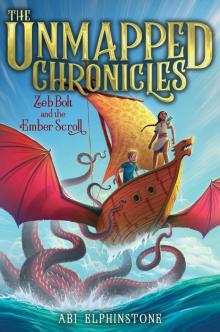 Zeb Bolt and the Ember Scroll
Zeb Bolt and the Ember Scroll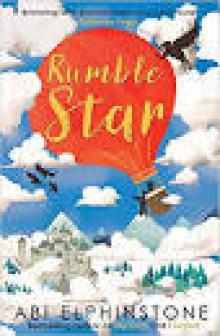 Rumblestar
Rumblestar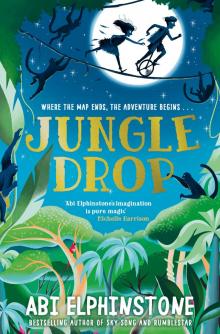 Jungledrop
Jungledrop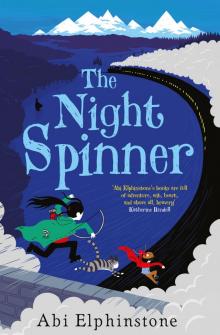 The Night Spinner
The Night Spinner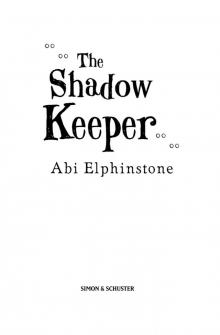 Soul Splinter
Soul Splinter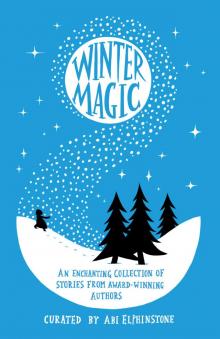 Winter Magic
Winter Magic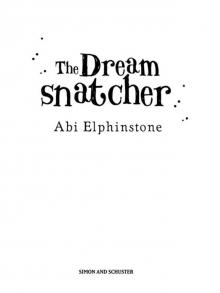 The Dreamsnatcher
The Dreamsnatcher Sky Song
Sky Song